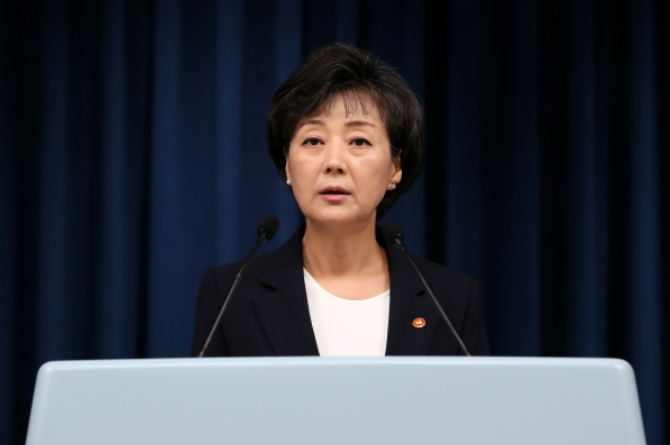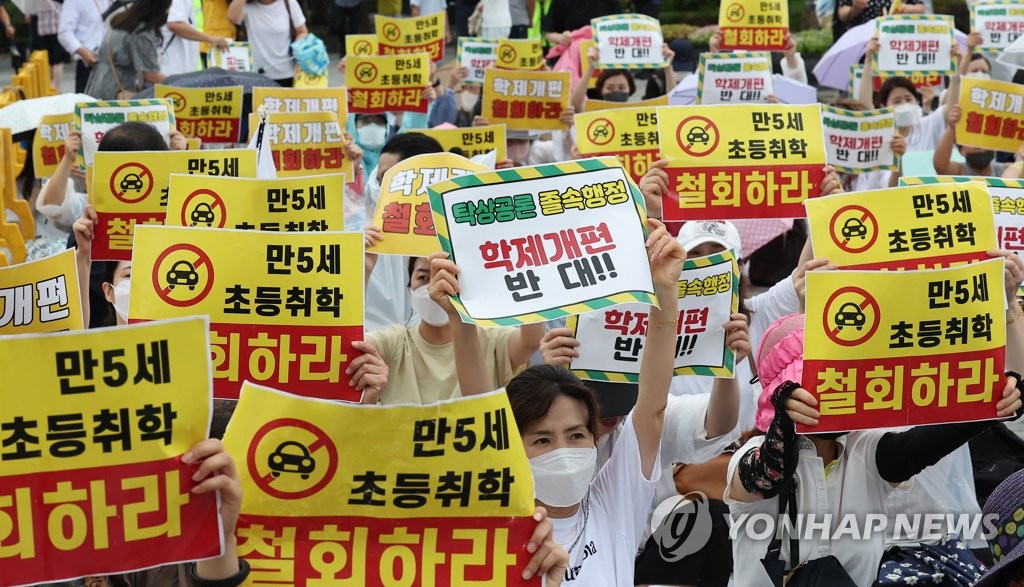On July 29, the Korean Ministry of Education (MOE) announced a plan to have all children begin elementary school at the age of 5 starting from 2025. This is one year earlier than the current age children start school. If this plan goes ahead, it will be the first time in 76 years that the elementary school enrollment age has been lowered. The MOE claimed that the main goal of this new policy is to reduce the educational gap between peers and to strengthen public education responsibilities. They believe it is more effective to invest earlier in childhood education. Opposing the MOE’s expectations, teachers and parents are strongly criticizing this abrupt announcement. They staged a rally in front of the presidential office calling for the withdrawal of the nonsensical policy. I object to this proposal for a few reasons. 5-year-olds do not have a fully formed cognitive development to absorb the intended content, which will spur further education competition between parents and there was no consultation with those affected by the policy before the announcement went ahead.
 |
| ▲ Park Soon-ae the Education Minister Making a Proposal at the Presidential Office (Photo from Naver) |
The main problem with this policy is that it overlooks the fact that it will deepen educational polarization by not considering the child’s development at that age. 5-year-old children are not capable of fully concentrating through a 40-minute class. They are still in the very early stages of their cognitive development. It will lead to elementary schools performing the role of simple childcare, which is not the school’s main purpose. Their priority should always be education and preparing children to be active contributors to society. Moreover, at this early age, only a short monthly gap between children can result in a huge difference in performance between peers. This applies to both their cognitive and physical development. Children may feel overwhelmed following the class, resulting in a sense of peer pressure at an early age. This is unnecessary stress for a young developing mind.
Along with that, parents will likely start spending on private education even earlier to lessen the learning gap. This will deprive the child of happiness, their right to play, and to grow in a healthy fashion. It will also have a huge impact on the early stages of child development and will form a vicious circle of depression and competition for the youth over the long run. According to the Korean Educational Development Institute, even though Korea already allows students to enroll in school a year early, the number of students that were voluntarily enrolled earlier dropped to 537 in 2021, from 9,707 in 2009. If we look at other counties in the Organization for Economic Co-operation and Development (OECD), only 4 out of 38 – New Zealand, Ireland, England, and Australia – start elementary school at 5-year-old. Including Korea, 16 countries have kids enter school at the age of 6 and the rest at the age of 7. Moreover, compared to our newly announced proposal, England and Australia have their own measures to take care of younger children. For example, England has a free operation class called ‘Nursery’ for 3 to 4-year-olds and ‘Reception’ for 4 to 5-year-olds where they learn basic reading and learning skills. Australia has a similar program called ‘Kindi’ (short for kindergarten) a year before first grade where children focus on activities appropriate for their age group. If Korea wants to change the starting age for elementary school students, then they must introduce a corresponding appropriate curriculum, as is done in other nations.
 |
| ▲ Academic Workers and Parents Protesting in Front of the Presidential Office (Photo from Yonhap News) |
Korea is well known for its intensified competition throughout society. From college to employment, young people experience an excessive amount of competition during their youth. However, by lowering the starting age for elementary education, the impacted generations will begin to suffer this pressure even earlier and more intensely. Every college has its capacity limits, and it is a bit far-fetched to enlarge the acceptance rate for a single year where the generation of both 5 and 6-year-olds that started school together are forced to compete for university enrollment. Companies are no different. They have a fixed number of personnel they can recruit. High demand and low supply are the main cause of competitiveness. This will inevitably lead to a disadvantageous structure for this specific age range of children in the future. The Korean government’s goal for this proposal is to lower the age range of employment and address the problem of youth unemployment. Furthermore, the government expects the country could counter the problem of rapid aging and a low birth rate that is expected to reduce the number of working-age adults in the country and may even see a rise in the birth rate sooner. Society-wise, it may have a beneficial influence, but viewing this from an educational perspective, considering the lives of children as a solution to manpower issues is unethical. Children are not the only ones who will experience difficulties. Schools will need more teachers to manage the increased number of students. They will also have to figure out how to accommodate the increased number of children. Expanding classrooms may not be as easy as it seems. Since most schools are run by the government, securing the budget for expansion will not be easy. A plan should be made to effectively carry out this policy without causing social chaos.
The foremost reason Koreans oppose this abrupt announcement is that it was declared by the MOE without consulting the people it will impact the most. They did not even notify or discuss the policy with the Offices of Education in different provinces, who will be the actual ones responsible for carrying out the new policy. This educational reorganization plan was never covered in President Yoon’s national task force, leaving citizens more perplexed. Consultations are necessary due to the number of drawbacks that academic workers and parents have to deal with if this policy is finalized. The biggest complaint from the parents is the lack of care provided by elementary schools as compared to preschools and kindergartens. For example, first graders in elementary school finish school before 1 pm, while preschools and kindergartens finish at 3 or 4 pm. With limited access for parents to after-school programs, the additional care hours are essential for working moms who can only pick up their children at the end of their day. In Korea, working moms are normally forced to quit their jobs by the time their children enter elementary school. Due to this absurd announcement parents are left to wonder if they were ever taken into consideration. Therefore, the government should thoroughly vet the problems of parents and schools before launching such a careless plan.
I strongly disagree with lowering the elementary school enrollment age. This new policy will bring chaos to society due to the inefficiencies it creates and its overall ineffectiveness. The government should re-examine this policy direction when discussing its upcoming plans. The proposal should be thoroughly vetted by all stakeholders before moving forward with any new educational policy. Additionally, we adults must view education from a children’s viewpoint, instead of an adult’s perspective and make policies prioritizing their well-being. Dutch philosopher Desiderius Erasmus once said, “The main hope of a nation lies in the proper education of its youth”. With this in mind, the government should never stifle the hopes of the youth, even if they firmly believe it is for benefit of the nation. Solving one problem, while creating others does nobody any good.
김경석 dankookherald@gmail.com

![[Campus Magnifier] Let's Surf the Library!](/news/photo/202404/12496_1765_4143.jpg) [Campus Magnifier] Let's Surf the Library!
[Campus Magnifier] Let's Surf the Library!
![[Campus Magnifier] Let's Surf the Library!](/news/thumbnail/202404/12496_1765_4143_v150.jpg)





